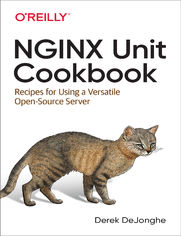NGINX Unit Cookbook - Helion

ISBN: 978-14-920-7851-7
stron: 70, Format: ebook
Data wydania: 2020-09-03
Ksi─Ögarnia: Helion
Cena ksi─ů┼╝ki: 55,24 z┼é (poprzednio: 64,99 z┼é)
Oszczędzasz: 15% (-9,75 zł)
Alongside its popular web server, NGINX provides a dynamic application server that supports configuration through a RESTful JSON API. The open source NGINX Unit server deploys configuration changes without service disruptions and runs apps built with multiple languages and frameworks. This updated cookbook shows developers, DevOps personnel, network admins, and cloud infrastructure pros how to quickly get started with NGINX Unit.
Hands-on recipes demonstrate Unit’s new approach and show you how to deploy and configure this server for different applications. You’ll learn how to run applications written in different languages on the same server, how to use NGINX Unit as the foundation for your web application development environment, and how Unit’s RESTful API simplifies configuration.
- Learn how Unit differs from other middleware application servers
- Install Unit using source code, Red Hat and Debian systems, or third-party repositories
- Configure Unit using application, router, and listener objects
- Start and stop the Unit server and the applications it runs
- Manage user permissions, Linux namespace isolation, and API security
- Run WordPress, Django, and other web applications with Unit
- Serve applications with an NGINX proxy or load balancer
Osoby które kupowały "NGINX Unit Cookbook", wybierały także:
- Windows Media Center. Domowe centrum rozrywki 66,67 zł, (8,00 zł -88%)
- 67,89 zł, (12,90 zł -81%)
- Superinteligencja. Scenariusze, strategie, zagro 67,89 zł, (12,90 zł -81%)
- Twoja firma w social mediach. Podr 58,64 zł, (12,90 zł -78%)
- Skuteczny marketing na TikToku. Jak zdoby 58,64 zł, (12,90 zł -78%)
Spis tre┼Ťci
NGINX Unit Cookbook eBook -- spis tre┼Ťci
- Preface
- Conventions Used in This Book
- Using Code Examples
- OReilly Online Learning
- How to Contact Us
- Acknowledgments
- 1. Unit Introduction and Features
- 1.1. Application Landscape and Unit Project History
- 1.2. Dynamic Web Application Server
- 1.3. Polyglotism
- 1.4. API-Driven Configuration and Server Management
- 1.5. Conclusion
- 2. Installation
- 2.1. Red HatBased Systems (.rpm)
- 2.2. Debian-Based Systems (.deb)
- 2.3. Go and NPM
- 2.4. Third-Party Repositories
- 2.5. Installing from Source
- 3. Configuration
- 3.1. Application Object
- 3.2. Listener Object
- 3.3. Route Object
- 3.4. Proxying
- 3.5. Static Files
- 3.6. Upstreams/Load Balancing
- 3.7. Targets
- 4. Usage and Operations
- 4.1. Startup and Shutdown
- 4.2. Applying Configuration
- 4.3. Limits
- 5. Security
- 5.1. Unix User Permissions
- 5.2. Linux Namespace Isolation
- 5.3. API Security Through Encryption
- 6. Application Integration
- 6.1. WordPress
- 6.2. Django
- 6.3. Flask
- 6.4. Express
- 6.5. Ruby
- 7. Ecosystem Integration
- 7.1. Reverse Proxying to Unit Applications Through NGINX
- 7.2. Securely Serving the NGINX Unit Control API
- 7.3. Containerized Environment
- 7.4. Deployments
- Conclusion
- Index





